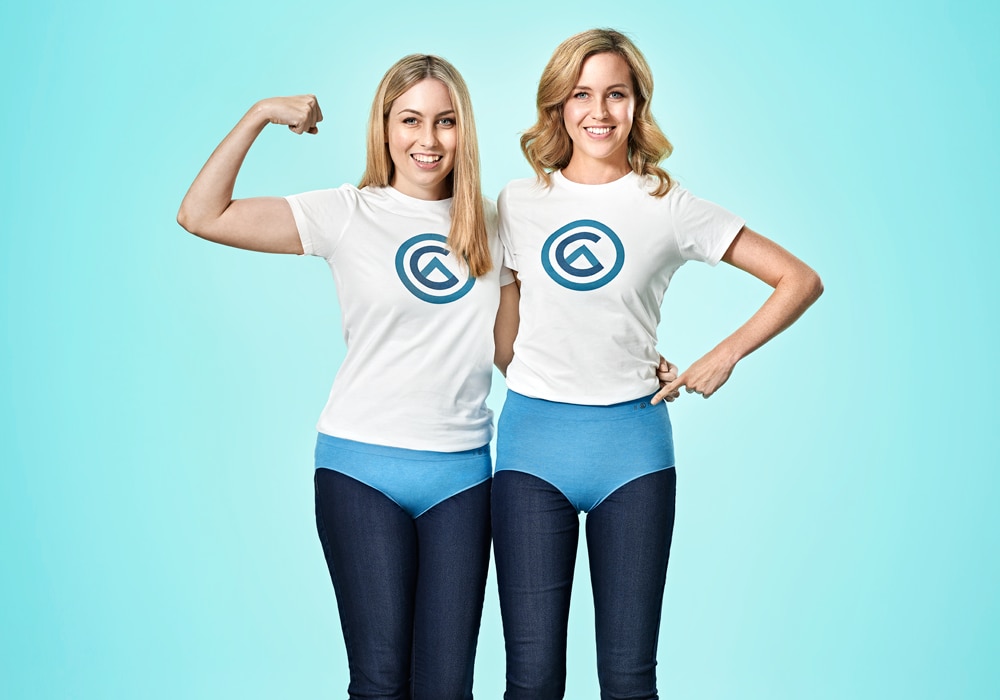In honour of World Ovarian Cancer Day, which is fast approaching on 8th May 2019, we wanted to bring you a story of hope, strength, determination and, above all else, unconditional love. The love between two sisters to be specific. Kristen Larsen was just 21-years-old when she was diagnosed with ovarian cancer. At the time, she and her sister Elsa were living it up, like many twenty-somethings, on a working holiday in London. Five years on, and the rollercoaster ride of living with an incurable disease continues for the sisters. This is their story...
Kristen's Story
Describe what your life was like before your diagnosis. Why did you and your sister move to London?
I felt excited about life. After working full-time and living out of home in Brisbane for a few years, my sister and I decided we wanted to see the world and experience living abroad. We applied for Visas and made the move to London. I landed my dream job working in HR, it was busy and I thrived off the excitement of working in London, and planning weekend trips to explore Europe and the UK. We were well settled and even bought a dog, Henry, who also loved travelling with us.
What symptoms were you experiencing before being diagnosed?
Looking back, I did have the classic ovarian cancer symptoms, probably for about 6 months, but they were subtle. They were things I just put up with and didn’t think were too concerning (bloating, slight abdominal pain, feeling full quickly). At that time I had no idea what the symptoms of ovarian cancer were.
What treatments did you undergo? And why did you decide to remain in London instead of returning to Australia?
Although I knew that the statistics were against me, I wanted to fight with everything I had, to fight for the life I had built in London. I had the option of returning to Australia, but that seemed like giving up. I wanted to beat this disease and carry on with my adventure of living abroad.
My initial treatment involved three months of chemotherapy to try and shrink the tumours for a more “simple” surgery. I then had my big operation which was eleven hours and involved a full hysterectomy and bowel resection leaving me with a permanent ileostomy stoma. This was followed by another two rounds of chemo and it was declared that I was cancer-free!
I continued on a maintenance drug infusion and daily tablet in the hope of preventing a recurrence. However, just over a year later, the cancer came back, which ovarian cancer so often does. I learned that when it recurs, it is usually incurable. This was a really difficult thing to grapple with, we realised that I would be in constant treatment fighting for the rest of my life. Undergoing cancer treatment is a huge emotional, physical and financial burden that takes its toll, and we decided it would be best to move back to Australia to have the support and security of family close by.
What motivates you to get out bed in the morning and push forward?
Throughout the past five years, I’ve met so many other women suffering from ovarian cancer, and sadly a number of them have since passed. Their lives have been cut short, and families left without their mothers / daughters / sisters. It is them that gives me the motivation to get out of bed, and try to raise awareness about this disease, and to advocate for more funding for more effective treatment options, and possibilities for earlier diagnosis.
What’s your relationship with your sister like?
My sister is my soulmate, we have always been so close, we have similar interests and friends and are basically just joined at the hip. The past five years have definitely brought us closer too, it’s a constant reminder to hold those dear to you close, to treat your loved ones with kindness and cherish the good times and make the most out of a beautiful day.
What inspired you to start sharing your story online via your site, Ovarshare?
It is a very lonely space getting an ovarian cancer diagnosis, no one you know has gone through it, and it’s quite hard to meet people who have. Luckily, I found others online who were sharing their journeys, and I felt it important and therapeutic to share mine. It has allowed me to connect with so many amazing women, and also to raise awareness about the disease.
What’s been your proudest moment?
On Teal Ribbon Day this February, I was invited to speak at a parliamentary breakfast, to share my story and urge our political leaders to increase funding for research. In attendance was the Prime Minister and Opposition Leader, as well as the Health Minister and Shadow Health Minister, in addition to other members of parliament and senators. It was an amazing opportunity, to show the impact and urgency of funding research. I think it always helps that those who are in power see the human side, not just the statistics.
What are some of the biggest misconceptions about ovarian cancer?
The biggest misconception is definitely that the Pap Smear Test will detect ovarian cancer. I even thought that it would cover any gynaecological cancer, however it really can only detect cervical cancer. It’s hard, I’ve definitely had people ask things like “but didn’t you have your pap test?” or “didn’t you get that vaccination in high school?”. People want to think it can’t happen to them, they ask if I have the BRCA gene or family history. I explain that I have had all of the genetic counselling done and tumour testing for mutations, but there's nothing. No explanation, just bad luck. It’s frightening that it can happen to anyone, and that you don’t even realise you're sick.
What advice do you have to young women, in particular, about the signs to look out for?
My advice is to look out for any changes in your body, even if they seem subtle or non-painful. If they persist, and they are not normal for you, it is important to see your doctor. And secondly, if you’re not happy with the doctor’s explanation, get a second or third opinion. I know so many women who have been treated with painkillers, or antibiotics or suspect it is dietary-related or IBS. I know we don’t want to be perceived as over-dramatic or paranoid, but at the same time, you are the expert of your own body, speaking up and advocating for yourself could save your life.

Elsa's Story
What was life like before Kristen’s diagnosis?
Life was exciting! We were a year into our new life in London and we were working hard with our careers, we loved to travel and would always be looking forward to the next destination. Life was great, we had our whole futures ahead of us and it felt like anything was possible.
What’s it been like to experience this journey with your sister?
It has been really difficult, it was such a shock and it just wasn’t fair. It was so hard to understand that this disease had taken over her body, and learning how her life was in danger. Kristen has been unbelievably tough, brave and positive through the whole experience though. Watching her go through surgeries, chemo, and frightening complications has been awful, but we do have a wicked sense of humour and always manage to have a laugh and bring light into the situation.
How did you approach each day while Kristen was undergoing treatment?
I would try to make sure that she was as comfortable as possible, getting on top of pain and nausea are priority! But once those things are under control it’s also so important for us to just spend time together, either watching Frozen in bed or going out for a walk with her dogs, whatever she has the strength for.
What have you learnt about yourself throughout this journey?
I have learned more deeply how to be kind and show love and compassion, how to put someone else’s needs before my own. It is something that lies in all of us, but we don’t necessarily practice it every day. Having someone who needs me like Kristen does, it’s a reminder about how precious life is, and the memories we make. I’d also say I’m less judgemental. People put on a brave face, they may look “healthy” but that doesn’t mean they’re not suffering.
What changes have you seen in Kristen over the past five years?
Definitely her ability to speak publicly, and her passion for advocacy. Neither of us had a background in this, had never written or delivered a public speech. Kristen doesn’t want others to suffer like her, she wants to improve outcomes and give a voice to others. It’s been really inspiring, and we've met so many wonderful, genuine souls along the way.
What’s your relationship with her like?
We share everything, we are also very similar too, so we enjoy a lot of the same things and places. We’ve always been there for one another by each other’s side. We have a lot of fun together, that’s probably the stand-out thing - lots of laughter.
What do you wish you’d known before Kristen’s diagnosis that you know now?
I definitely wish I had known what the signs and symptoms were. I had no idea what ovarian cancer was or that it was even so deadly. I'm sure she would have made comments at dinner about being full, or feeling bloated, but I would have dismissed them thinking she was just a bit too ambitious with her food.
What advice do you have for anyone who has a friend or family member with cancer?
To not complain about the little things, there’s enough to worry about, so looking at the positives is important. Getting educated about the type of cancer and treatment options is vital too, particularly with metastatic cancer (cancer that has spread), it’s important to be able to navigate clinical trial options and specialist oncologists/surgeons.
You can follow Kristen's journey via her website, Ovarshare. To support funding into ovarian cancer research, consider purchasing a pair of Bonds Overies undies and we'll donate 100% of the profits to Ovarian Cancer Australia (OCA).
For further information and support, please visit the OCA website or call them on 1800 660 334.
 Click it & Collect it for free
Click it & Collect it for free FREE shipping for AUS members.
FREE shipping for AUS members. 


